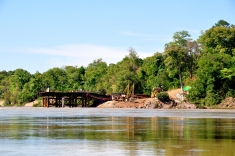PR – Déjà Vu for the Mekong
Don Sahong Dam Construction Sets Dangerous Path for Mekong River
FOR IMMEDIATE RELEASE
Bangkok, Thailand: A recent site visit by International Rivers has confirmed that construction work on the controversial Don Sahong Dam in Southern Laos has continued despite opposition from neighboring governments and ongoing calls for regional consultation. The construction confirm fears that the Don Sahong Dam is following the same dangerous trajectory that was taken with the Xayaburi Dam, with construction taking place before neighboring countries have had a chance to undergo prior consultation, impact studies are finalized, and the project’s far-reaching transboundary impacts are understood.
"Continued construction towards the Don Sahong Dam is an unwelcome déjà vu for Mekong communities and governments as Laos continues to move forward unilaterally with decisions which threaten the entire region,” said Pianporn Deetes, Thailand Campaign Coordinator for International Rivers. “The risks go well-beyond the borders of Laos – the Don Sahong Dam will irreversibly impact livelihoods and food security throughout the Mekong. Yet Laos remains unwilling to respect the requests of neighboring countries for construction to halt while transboundary impact studies and further consultation can be carried out.”

The site visit held in early June confirmed that workers have begun construction of a bridge connecting the mainland to Don Sadam Island. The bridge will create an access route for construction on the Hou Sahong Channel. Villagers around Don Sahong were informed in November 2013 that they would be resettled to make way for the dam, but do not yet know when they will be moved, creating a feeling of uncertainty regarding the future. While fishing has been banned on the Hou Xang Pheuak Channel to allow for the Malaysian company, Mega First Corporation, to work on creating a fish passage, no compensation or livelihood restoration has been provided for families who can no longer depend on the significant source of income derived from the river.
Vietnam, Cambodia and Thailand have clearly stated that the Don Sahong Dam must undergo Prior Consultation, as required under the 1995 Mekong Agreement. The three countries made their position clear submitting letters to Laos in response to the initial Prior Notification of the Don Sahong Dam, and reiterated their request for a special meeting of the Mekong River Commission (MRC) in January. At the second Mekong Summit in Ho Chi Minh City in April, Vietnam and Cambodia strengthened their position in calling on Laos to halt all construction of dams on the Mekong mainstream for a ten year period until further studies – including the Mekong Delta study and MRC Council study – could be completed. However these requests have gone unheeded by Laos.
“Under international law, downstream countries are entitled to robust consultation,” said Ame Trandem, Southeast Asia Program Director for International Rivers. “It’s time for Laos to respect the rights of its neighboring countries by accepting a ten-year deferment period and allowing for joint decision-making based on science and consultation over the future of the shared Mekong.”
Further opposition to the Don Sahong Dam, along with the Xayaburi Dam, was expressed in a letter sent by Cambodia’s Senate to Mekong leaders on May 5. The senators call for the immediate suspension of the Xayaburi and Don Sahong dams and for Thailand to cancel Xayaburi Dam’s Power Purchase Agreement. The letter states that the “[Xayaburi] Project constitutes the greatest trans-boundary threat to-date to food security, sustainable development and regional cooperation in the lower Mekong River basin.” The letter also states that the Xayaburi Dam failed to complete the MRC’s prior consultation process as mandated by the 1995 Mekong Agreement. In Thailand, on June 24, the Supreme Administrative Court will issue an order as to whether or not they will accept the lawsuit filed against five government bodies, including EGAT – the Electricity Generating Authority of Thailand – who have agreed to purchase 95% of the power from the Xayaburi Dam. The lawsuit was filed in August 2012 by 37 villagers from provinces in North and Northeastern Thailand who will be impacted by the Xayaburi Dam.
As preparations are made for the 20th Mekong River Commission Council Meeting to be held in Bangkok, Thailand on June 26, the cacophony of voices calling for immediate action to stop the unilateral and destructive path, which threatens to destroy the Mekong, is getting stronger. “It is once again reckoning day for the future of the Mekong River, however this time around there can be no confusion as to the position of Vietnam, Cambodia and Thailand. Laos must recognize and accept that the Mekong is a shared river, and decisions must be made jointly among Lower Mekong countries, to preserve the future of this irreplaceable resource,” concluded Ms. Deetes.
Deliberations over whether the Don Sahong Dam is required to undergo the Prior Consultation process will be on the agenda of next week’s Council meeting. If the four countries cannot reach an agreement, then the decision will be elevated to the diplomatic level, and risks following the footsteps of the Xayaburi Dam – a case that remains unsettled.
- Ame Trandem, Southeast Asia Program Director, International Rivers: T: +66868822426 E: ame@internationalrivers.org
- Painporn Deetes, Thailand Campaign Coordinator, International Rivers: T: +66814220111 E: pai@internationalrivers.org
- Photos from International Rivers' Don Sahong Dam Site Visit
- Letters from Cambodia's Senate to Mekong leaders (part 1) (part 2)
- More information on the Thai Administrative Court Lawsuit against the Xayaburi Dam
- Media kit for the Don Sahong Dam
- Media kit for the Xayaburi Dam


